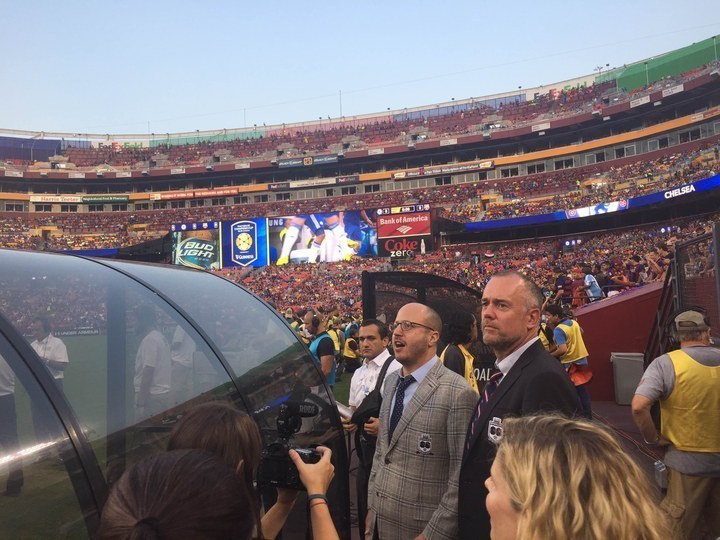It’s a late July afternoon and two bald British men in a Mini Cooper are having cheesesteak problems. They're on their way to Landover, Maryland, to watch a meaningless scrimmage between the soccer powerhouses Chelsea and Barcelona by way of Philadelphia, and the men in question are Roger Bennett and Michael Davies — the NBC Sports soccer pundits known as the Men in Blazers.
As they motor down I-95, the duo are trying to cope with an unfamiliar issue: a deep and scornful social media backlash. As part of a photo op for their sponsor, Mini, Rog and Davo — as they’re known to hundreds of thousands on their popular podcast — are making the pilgrimage to taste-test cheesesteaks at Pat's and Geno's, two beloved temples to heart disease. The event is supposed to be a throwaway — a fish-out-of-water Americana stunt for the expats — but things derail when they mention the pit stop on Twitter and Instagram.
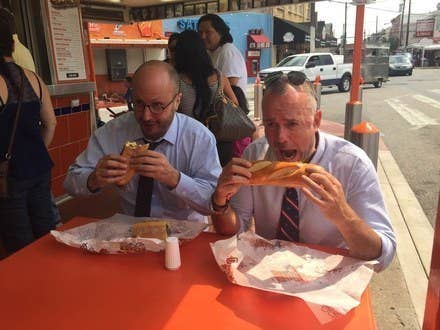
“We’ve never upset more people in a year of doing television than we have with these few tweets,” Bennett says, mock-but-maybe-actually astonished, scrolling through the replies on his phone. “Apparently, Pat’s and Geno’s are both crap tourist traps and we’re crap too for going,” he laughs.
Davies shrugs it off, noting that the pair had originally planned to take the Mini to Gettysburg for a patriotic photo op before thinking better of using a sacred battlefield as a sponsorship venue. (“Too soon,” Bennett deadpans.) But Bennett, dressed not unlike a lawyer at the end of a long day — navy tie askew, over a lightly wrinkling blue oxford shirt tucked into navy slacks — is still thumbing through the replies with a shit-eating grin.
“You don’t think we’re going to get beat up in Philly for wearing ties, do you, Davo?” he asks cheekily, followed by a short awkward silence, which Bennett breaks himself. "Philadelphia fucking Pennsylvania,” he says before pausing, breathing in deeply, closing his eyes, and uttering in his Liverpool accent with rapturous satisfaction and hushed reverence one of his trademark phrases: “I love America.”

If there’s one thing the Men in Blazers are selling, it’s this spirit of adopted patriotism. The official Men in Blazers credo is “Driven by the belief that Soccer is America’s Sport of the Future. As it has been since 1972." It’s under this banner that Bennett and Davies have built an intensely loyal following since 2010, converting a one-off World Cup podcast into a iTunes chart-topping podcast (between 250,000 and 350,000 listeners weekly), a satellite radio show, regular TV appearances, and, finally, their own 30-minute NBC Sports television show. Now they’re on the verge of spearheading one of the most aggressive, concentrated gatherings of the sport’s personalities ever assembled on our shores in order to bring global soccer to a growing cadre of ravenous American fans.
Their style is hyper-combustible: shades of early SportsCenter mixed in with an indefatigable Bill Simmons-esque obsessive fandom/devotion to pop culture references. The television show is frantically paced and proudly low-budget; many of the “graphics” are hand-drawn-with-markers signs. Their tchotchke-adorned studio is affectionately nicknamed "the panic room" and is the size of a New York City apartment closet. The weekly podcast is longer (episodes can exceed 90 minutes) and slower-paced, and moves seamlessly between detailed discussions of tactical soccer formations and anecdotes about tingling nipples.
Bennett and Davies aren’t the first soccer commentators to evangelize and parse the global game in America. But they’re the first to distill the game, harnessing the whimsy of the internet and pop culture and without any of the pretension that comes from introducing a sport with a rich history to a new audience. There’s an inclusiveness to the duo’s conversations — mostly through a flurry of oft-repeated jokes and tropes — and a presentation that appeals to fans both young (silliness) and old (’80s pop culture references and lamentations of balding) and is, in a way, almost soothing for newcomers to the sport. Put simply: It’s hard to feel embarrassed as a new soccer fan with Bennett and Davies as your guides. Both men are overly self-effacing; they describe their style as "suboptimal" and regularly apologize for simply being on the air. The pair’s Twitter account describes the Men in Blazers as “kind of like Car Talk without the cars."
Ten years ago, Bennett and Davies — who first met at a wedding of a mutual friend on the day of the 2006 World Cup Final, bonding over missing the thrilling penalty kick finale — would have been the most unlikely of American sports luminaries. They’re both bald, fortysomething white men with noticeable accents discussing the minutiae of soccer matches taking place in small British cities that few Americans can even pronounce, like Leicester (pop. 330,000), Swansea (pop. 239,000), and Bournemouth (pop. 465,000). Ten years ago, the Men in Blazers might have had a hard time securing a steady gig on a local public access channel.
Then again, that’s kind of the point. Starting in 1905 — when Teddy Roosevelt suggested soccer as a healthy alternative to the skull-crushing, frequently death-inducing American football — soccer’s star in America has supposedly been on the rise. Since the United States hosted the World Cup in 1994, expats have watched in the States as the sport’s tide rises every four years. Bars fill, major networks devote airtime, flags wave. But for years soccer support has been a tentative, self-doubting, un-American style of fandom; it was excitement for the spectacle and the sport, without any deep understanding of the culture. At the end of the month, soccer’s small, dedicated quorum would watch as Americans retreated to back to baseball and the upcoming football season. Soccer’s tide would recede, albeit slightly less each four years, only to pick back up again in early July with a rash of blog and news articles asking: Is Soccer the Sport of the Future Forever?
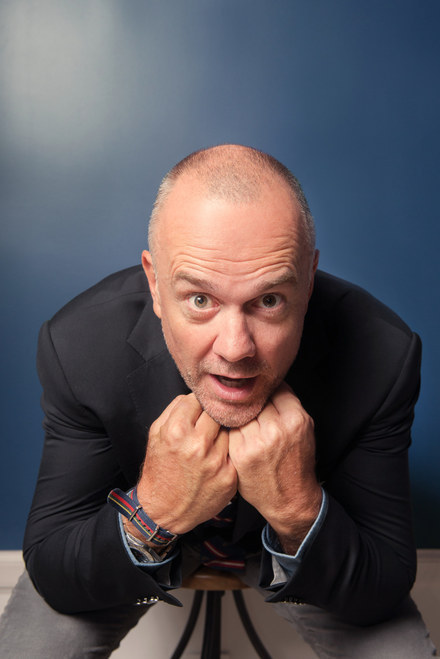
Yet sometime between 2010 and 2014 the sport took off in earnest. The U.S. men’s and women’s national teams exceeded expectations in their respective World Cup campaigns, playing riveting nationally broadcast matches. Fan groups like the American Outlaws began to follow the U.S. national teams, co-opting chants, traditions, and the rowdy soccer atmosphere from Europe and bringing them to American tailgates. In 2012, NBC Sports bought the English Premier League TV rights, promising to broadcast all games live. Once-in-a-generation talents like Lionel Messi and Cristiano Ronaldo played the sport at such a high level that young sports fans in the U.S. couldn’t help but take notice. EA Sports’ FIFA soccer video games quietly became required playing in every college dorm in the country. Major League Soccer upped the frequency with which it courted America’s best players and Europe’s oldest legends.
This sort of fan behavior is naturally attracting brands, which are pointing toward soccer’s burgeoning and coveted 18- to 34-year-old, affluent, upwardly mobile demographic. John Guppy, former president and CEO of MLS's Chicago Fire and head of Gilt Edge soccer marketing, says the swing began in earnest in 2012. “It was a turning point in terms of the types of conversations we'd have with people from corporate America. It used to be that targeting the Hispanic market was the reason why they'd care. 2012 was when that word switched to millennial, which for so many executives was key. And then you see that 6 out of 10 soccer-loving millennials are nonwhite.” By the end of the 2014 World Cup, the sport of the future was looking an awful lot like the sport of the present.
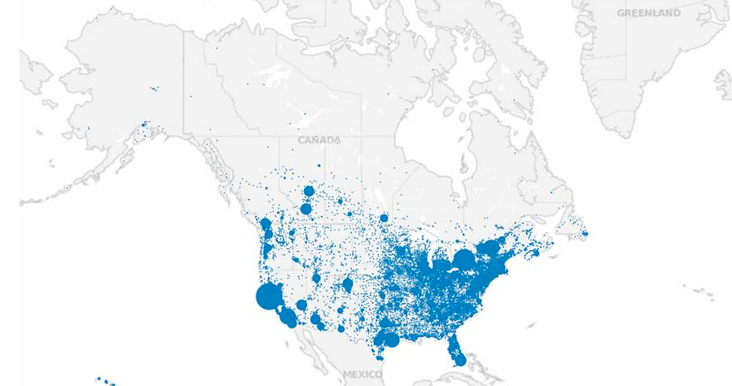
And the Men in Blazers were poised to capitalize on it. Bennett and Davies see Men in Blazers as both a happy accident brought on by of the confluence these forces as well the product of the hard work of yelling enthusiastically into the void until somebody took notice. It’s true that Men in Blazers, in its current iteration, couldn’t have thrived or even existed 10 years ago, but now that it is, they’ve stepped into a new role: They’re not just ambassadors for the game, but translators. For the tens of thousands of their fans — affectionately referred to as GFOPs, or Great Friends of the Pod — the duo is responsible for making sense of the meta-narratives, quirks, and micro-moments that make the European game interesting. They specialize in elucidating the sort of things that American fans would assuredly miss, or fail to fully understand, by providing significant context.
"We're two bald men on a surfboard trying with moderate success to tow in football.”
“They’re gatekeepers,” Ron Wechsler, NBC Sports SVP of original programming, said of the pair. “They don't make it intimidating for Americans to participate in something that used to reside outside their cultural sensibility. Probably the most interesting, critical threshold is: Can people who can’t approach the sport from a shared geographic point of view feel attached the way they can with a local sport? They take the silly and the ridiculous and they combine it with sturdy analysis and they help with that.”
Though Bennett and Davies are loathe to call themselves gatekeepers — “At best we're a tugboat or two bald men on a surfboard trying with moderate success to tow in football,” Bennett says — their actions suggest something different. This November, the two are hosting BlazerCon, a soccer fan convention. Halfway between New York and Philadelphia, Bennett described the conference while on the phone trying to recruit a FOX broadcaster to join a BlazerCon panel: “We're doing a rather odd and curious project this November. It's called BlazerCon — like Comic-Con but way nerdier and for global football. We're going to get together a couple thousand of America's fast-growing superfan collection, and we got a cast of characters. It'll be a bit of a global football orgy.”
It’ll be a well-attended orgy. Bennett and Davies have booked Europe’s soccer brass, including Premier League chair Richard Scudamore, Liverpool CEO Ian Ayre, and the chairs of Roma, Southampton, and Bournemouth, plus Everton Manager Roberto Martinez, members of the US Women's National Team, ESPN’s Bob Ley and some of the Men in Blazers' unlikely friends, including Moneyball baseball general manager Billy Beane. The plan, according to Bennett and Davies, is to bring a series of deep, nerdy, obsessive soccer discussions to American fans. Not mentioned and perhaps just as important, however, will be to parade this rabid fan base in front of Europe’s most influential sports executives. Bennett and Davies have built an adoring legion. Now it’s time to show them off.
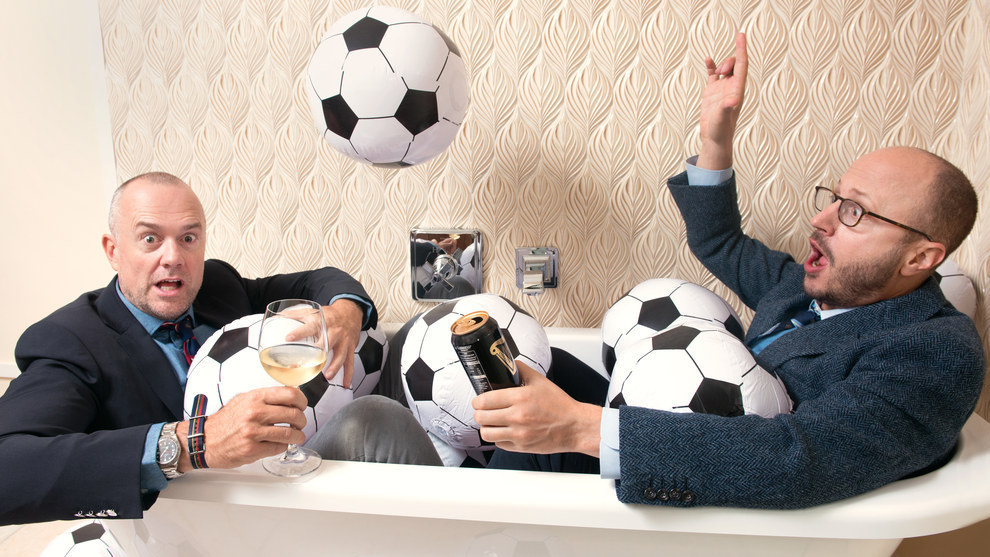
To pacify the angry GFOPs, the Men in Blazers decide to stop at a third cheesesteak palace, Jim’s Steaks. Once the quick photo op is over, Davies parks the Mini while Bennett strikes up a conversation with an older, salt-of-the-earth woman working at the counter at Geno's. Though traditional cheesesteak protocol is to tersely bark an order and move down the line Soup Nazi–style, Bennett saunters up ready to chat. He asks her age and how long she’s worked at the stand. Within seconds, he’s won her over with his accent, sincerity, and deeply inoffensive aura. As if part of some divine script, she hands Rog a Geno's souvenir trinket pen that bears the phrase “Proud to Be an American,” and Bennett is ecstatic. He neglects his now-sweating steak on the counter to inspect the pen and reaches out to clutch my arm. “Fucking amazing! Was this my citizenship test? Did I pass?” he shouts.
Bennett’s whirlwind persona is offset by a darker intellect and a quiet but formidable ambition. He is deeply literary — on the podcast he frequently mentions and quotes World War I poetry, a somber favorite of his. A recent visit to Spain has him fixated on the country’s culture and history, and during our car ride he routinely finds ways to reroute the conversation into digressions about Franco and antifascism. When we talk of the business of Men in Blazers, Bennett’s goofy demeanor evaporates and his focus is intense. It’s the same energy and air that he projects as a recurring guest on Charlie Rose or CBS This Morning, or in print in the New York Times, where Bennett is often quoted as a footballing authority.
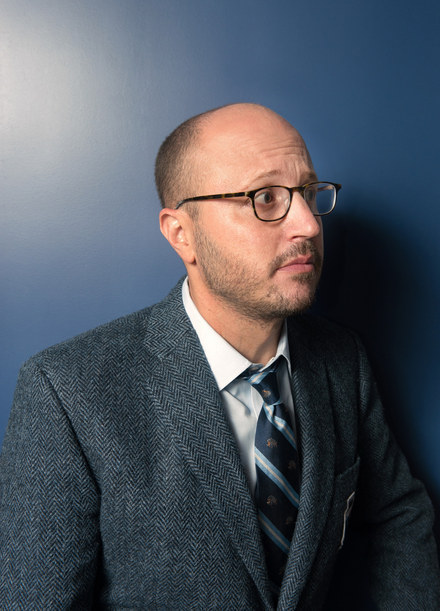
“Rog is really the heart and soul of this thing,” Davies tells me later in the day during a moment alone. “Men in Blazers is really fueled so much by him and his tireless ability to never lose momentum. He’ll go home tonight and stay up late even though he has a 4:30 a.m. flight to England and read every fan tweet and every comment and send dozens of emails to complete strangers. He’d hate me saying this, but oftentimes I feel like I’m really just kind of producing Rog while he does his thing and playing off him and keeping him on the line.”
Producing, of course, is what Davies does best. By his own right, Davies is a prolific producer and TV executive, responsible for bringing Who Wants to Be a Millionaire to the U.S. as well as jumpstarting Jimmy Kimmel’s late-night career. As part of his day job as the founder and head of Embassy Row studios, Davies oversees dozens of high-profile projects, including Comedians in Cars Getting Coffee and Watch What Happens Live, of which he’s the executive producer. His control room experience bleeds into the Men in Blazers show, where Davies controls the cameras on set from a switch positioned out of frame on his thigh.
Davies is charming, with the rare ability to schmooze and still seem earnest. Being from London, he’s the bon vivant of the two. In our 12 hours together, he makes multiple mentions of his vacation home in the Hamptons as well as his fondness for his annual golf trip where his friends play famous British Open courses, all somehow without sounding obnoxious. On the ride, he’s constantly interrupting Bennett’s BlazerCon recruitment calls with wisecracks. Men in Blazers is just one of dozens of media properties under his stewardship, and yet, despite a seemingly unending list of obligations, he’s the consummate good sport.
Bennett rarely leaves the house without a tie, yet he still projects a more down-to-earth vibe. On the phone, in email, and in person he’s a tsunami of cordiality, saying things like “I’m better for having spoken to you, you beautiful man” with the enthusiasm of a Midwestern door-to-door frozen steak salesman. Here’s just a few ways he’s signed off in our email correspondence: “you are a remarkable bloke.” “you are a magic man.” “ you beauty.” “#America.” It’s unexpected, infectious, and genuine; it’s also perfectly easy for Davies to join in and play off of. You see this when the two encounter fans in the wild.

At Pat’s Steaks, a nervous GFOP approaches the two men mid-bite, and both Blazers jump up eagerly for a five-minute conversation. Bennett and Davies immediately begin peppering the fan with increasingly personal questions: Who’s your team, what do you do in the world, and, Bennett’s favorite, how is your family doing?
Turns out the fan helps run a small craft brewery in the area, so he brings them a few beers, which they accept, asking for a business card. “Any way we can help you, my good man, you let us know,” Bennett says putting an arm around the fan before snapping a selfie.
“The first thing we always ask when we meet a GFOP is 'who's your team' to find out why they support them,” Bennett tells me later in the car. “What amazes us about America is that the reason they start supporting a given team is deeply arbitrary. But when they commit and fall for them, they do it incredibly fast and deeply,” he says.
The fan culture around Men in Blazers is unique in the world of sports punditry. Every day the pair’s Twitter and Tumblr accounts are swarmed with outrageous photoshopped fan art, like one of U.S. Men’s National Team captain Clint Dempsey riding a red-white-and-blue rocket pop with the head of a shark in space while rainbows shoot out of his mouth. The two routinely receive full parody song fan submissions based off of obscure soccer personalities and inside jokes from their podcast. Grown men tweet at them incessantly, adding #GFOP to their Twitter bios. Spouses request their involvement in marriage proposals. A small and dedicated group of fans runs a wiki dedicated to the duo’s peculiar vernacular and inside jokes. (Warpig is “the nickname of former Belgium footballer, Marc Wilmots and the proposed mascot for the Men In Blazers National Team"; a Shass is “a shot on goal that turns into a pass.”)
“Nobody likes the Men in Blazers. You either don't know about them or you love them," says John Green.
“Nobody likes the Men in Blazers. You either don't know about them or it’s not your thing or you love them," says YouTube celebrity and GFOP John Green of Bennett and Davies’ fanbase. “I was doing an event in Dallas for The Fault in Our Stars [Green’s best-selling book and movie]. There were 4,000 people there, but one person was holding up a sign that said something about Rog and Davo, and I said to my publicist, ‘I'd really like to meet that person after.' And then he and I had a nice conversation about football. That kind of fan relationship is the internet at its best: stuff you can unambiguously, totally, enthusiastically love.” And the Men in Blazers fandom is uniquely internet-fueled, much like international soccer, which is widely heralded as the internet’s sport. “Baseball became the sport of America on the radio, football came of age in the televisual age, but the internet is where soccer has really taken off," Bennett likes to say.
Participating in that sort of internet fame, however, can be taxing. The bespoke relationship that Bennett and Davies have cobbled together with so many fans through meetups, personalized cards, emails, and Twitter, Facebook, and Instagram replies is difficult to scale as the duo get bigger. “I don't think Men in Blazers works as well as a mass-appeal phenomenon,” Green said, drawing from his own, sharply sudden internet-fueled popularity. "I’ve seen that whenever something is big, big, big, it becomes paradoxically less powerful in the lives of the people that care about it, like live and breathe for it. I don't think they need to become the next Bill Simmons, because I don't think we live in his era anymore — I don't think with the internet that we need to make gigantic, one-size-fits-all stars. Unique communities like this can allow for people to become as successful as they need or want to be.”
It’s a question Bennett firmly dismisses. “We've had an advantage here,” he says. “We've watched Wayne’s World, and that’s always been our playbook.” He insists that it’s still an operation written, improvised, and delighted in by its creators. “We don't have the same kind of pressures and challenges as a writer, like Green, or band would have. We're just coasting off football’s weekly narrative and the Star Wars bar of characters that is global football. It's liberating for us.”
In the next breath, though, Bennett notes that the fans keep them on their toes. “They never let you get away with anything,” he says before telling me he’s just done the taxing work of sending 150 handwritten cards to GFOPs who’d written or emailed in with requests or are ill or “needed their spirits lifted.”
Of course, success isn’t guaranteed for Bennett and Davies. Their madcap TV broadcast is still a niche offering, with a 10 p.m. Monday time slot that’s steamrolled September through December by Monday Night Football. The show got off to a rocky start, averaging just 30,000 viewers for its first three episodes during late 2014. In 2015, though, the show grew to an average of 100,000 viewers; by May of last year, that number jumped to 265,000. Not exactly must-see TV, but the duo plans to continue leveraging Davies’ Rolodex and soccer’s rising tide to bring on high-profile guests with an appreciation for the sport to talk about anything and everything. Recent guests include the likely (Mumford & Sons, John Oliver, Noel Gallagher), the unexpected (Vampire Weekend, David Simon), and the delightfully unexpected (Laura Linney).

We’re in Maryland crossing the Susquehanna River in the Mini at the magic hour and the light of the late-day sun is dancing across the water, but nobody notices because Bennett and Davies are trying to settle a bet about whether Donald Trump likes soccer. Bennett’s cursory googling is fruitless, but the consensus is that a) he’s most likely to buy a team in order to tank the sport from the inside and b) they need to get him on the podcast. The two are no strangers to those who still question soccer’s bonafides — like Ann Coulter, who sees the sport as antithetical to American exceptionalism and “a sign of the nation's moral decay.”
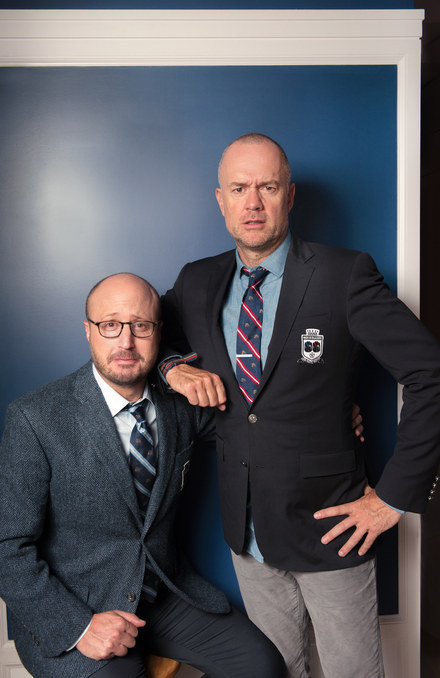
Bennett and Davies secretly love those who antagonize the sport. “At the golf club I play at the kids are all into soccer and the dads loathe it," Davies says from behind the wheel of the Mini. "They actually use the word hate. People don't ever walk around saying 'I hate bowling' or 'I hate archery.' But the people who don't like it hate it. And that is, I think, fantastic. But also, sometimes they have a point: The soccer Americans were sold for years and years was total crap.”
“My friend used to manage Tiësto, and when he was just starting to blow up, he'd talk to every major media outlet and pitch him, but nobody wanted to write about him,” Bennett says, playing right off of Davies. “It wasn't on radars. They just didn’t understand the style of music or how the demographics could change for that kind of music to take over. And now, of course, he's massive, and I kind of feel like soccer is like that.”
“Soccer is the EDM of the sports world, I love that,” Davies fires back.
“Exactly,” Bennett says, energized. “Soccer doesn't have to win over everyone—”
“You just have to take a lot of drugs, take your shirt off, and enjoy it with everyone else,” Davies blurts, cutting him off.
“Exactly!” Bennett squeals, clapping his hands together.
Mere miles from FedEx Field and only minutes away from the coin toss of the match — which the pair are presiding over — the Mini is stuck in gridlock. Davies is joking about the possibility of a police escort when we crawl by the stadium's outer lots, which are already at capacity with legions of chanting fans of varying race, gender, and age wrapped in Chelsea blue and Barcelona’s ubiquitous jerseys. What’s most staggering isn’t the size of the crowd but the enthusiasm: Everyone is wearing a jersey, and the children are losing their shit, running ahead of almost equally dizzied parents. “Look at this — this is America, right here," Bennett says. He yells out the window, "Shalom!"
This particular version of America — the one that can pack an 80,000-person NFL stadium in the middle of July for a meaningless scrimmage between two teams who’ve left their superstars at home — is something over which European leagues and clubs are salivating. “I think there's definitely big room for growth,” Liverpool Football Club CEO Ian Ayre says. “I mean we’ve seen it already — we have 20 million followers in the U.S. — and in terms of international markets, the U.S. has quickly become one of the biggest, especially across social media. And they’re coming in through that and then just engaging with all of our other offerings,” which, of course, includes merchandise and paid Liverpool content.
If conditions are primed and the sport of the future has become the sport of the present, then November’s BlazerCon will be the first real test of all of these groups converging at the same place and time in America without a soccer match as a backdrop. “I spoke to Roger and heard what it is they’re trying to achieve and it was an easy sell,” Ayre said of the conference. “If I was a Liverpool fan in America, I'd want Liverpool to be a part of this in a meaningful way, and I think that’s the core of why I’m coming.”
"Soccer is the EDM of the sports world. I love that."
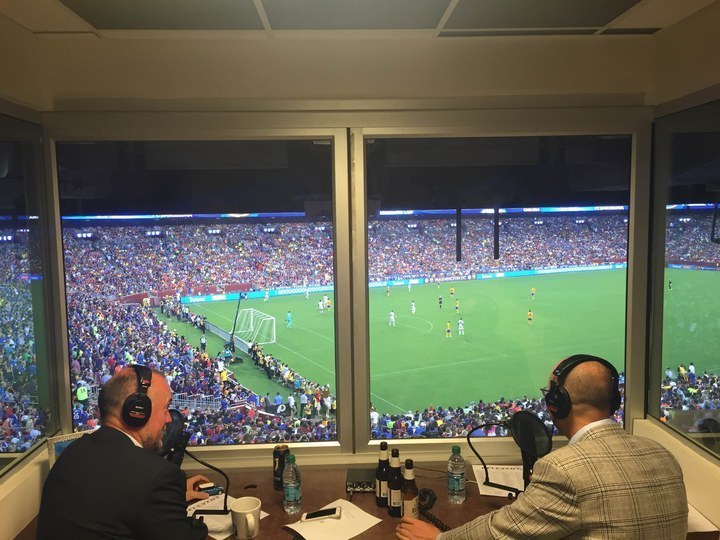
At FedEx Field, the coin toss goes off without a hitch. Davies and Bennett wander through the bowels of the stadium and spend the game in the press box, largely ignoring the preseason match to record the first podcast of the new Premier League season. The vantage point of the press box offers a perfect view of Chelsea’s Eden Hazard as he carves his way through five Barcelona defenders to slot a beautiful goal into the back of the net, but Bennett and Davies (a Chelsea fan) have to catch the strike on replay, pausing the podcast to wait for the crowd noise to die down.
When the podcast wraps, the two recline for a minute, nursing cans of Guinness (which provides the booze free as part of a sponsorship) and trying gamely to feign interest in the match, before being interrupted by a cadre of fans who’ve recognized them from the stands on the other side of the press box glass. Bennett and Davies pose for photos with them, pretending as if they’re trapped. When it’s done, the men happily slump back into their chairs, ready to call it a day. After the match, they make their way to the parking lot alone, stopping to take between 30 and 50 selfies, mainly with young children and grown men behaving like children. Davies, especially, humors every fan with their own photo, turning the five-minute walk into a 30-minute affair.
The two have abandoned the Mini for a chauffeured black town car down to D.C. Inside, both men sit quietly with their phones, not reading emails but rifling through Twitter and Instagram, checking hashtags and replying to and rapidly retweeting and favoriting fans who’ve spotted them in the press box or on the field or in the parking lot during the game.
Bennett diligently recaps the day: “80,000 fans there tonight screaming their bloody faces off,” he says, equal parts exasperated and exhausted. “It’s a bit like stepping into the future. I guess maybe it’s here,” he laughs. Later he’d send an email with a similar thought: “80,000 fans in that stadium. Barely a whiff in the local media. Very Tiesto.”
As the car edges closer to the hotel, Davies is asleep, and for the first time all day there’s a sustained silence. Out the window, you can see the darkness that is the National Mall, the grandeur of the meticulously lit Washington Monument up ahead. From the backseat, hushed and to no one but himself, Bennett’s voice gently breaks the silence as the monument comes into view. “Ah, now look at that. I love America."
